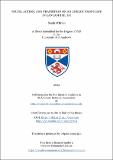Files in this item
Truth, action, and transition on an energy frontline in Lancashire, UK
Item metadata
| dc.contributor.advisor | High, Mette M. | |
| dc.contributor.advisor | Reed, Adam | |
| dc.contributor.author | O'Brien, Sarah | |
| dc.coverage.spatial | 229 | en_US |
| dc.date.accessioned | 2023-03-13T11:33:17Z | |
| dc.date.available | 2023-03-13T11:33:17Z | |
| dc.date.issued | 2023-06-12 | |
| dc.identifier.uri | https://hdl.handle.net/10023/27164 | |
| dc.description.abstract | Based on thirteen months of ethnographic fieldwork in the northern English region of Lancashire, this doctoral research focuses on practices of truth-making and relations of responsibility within a community resisting the development of a controversial hydraulic fracturing project at Preston New Road (PNR). I explore their lived experiences of protest and energy extraction at a time of anthropogenic climate change and intensifying calls for energy transitions. I examine how collective and intimate encounters with a perceived ‘system’ on the frontline lead my interlocutors to ask fundamental questions about the reality in which they live. Through everyday frontline practices, I show how interlocutors collectively establish, connect, and evidence different dimensions of truth as they resist the extraction of hydrocarbons and search for alternative ways to live. People enter, act through, and leave relations of responsibility to bring about a reality in which they want to live. I thus suggest that examining relations of responsibility and truth as a value that is realised through action can help us understand spaces of conflict and confrontation. Through protesting, monitoring, and maintaining a collective presence at PNR, interlocutors ethically and materially attempt to separate themselves from the hydrocarbon extraction. In doing so, they endeavour to create a rightful reality founded on the generative notions of truth, action, and responsibility. My ethnographic analysis therefore proposes that the energy frontline at PNR can be apprehended as an onto-epistemic frontline where matters of truth set the world in motion. I suggest that when scholars recognise truth as a matter of representation, creative transformation, and persuasive imagination, we can better identify and understand conflicts and possibilities for change. | en_US |
| dc.language.iso | en | en_US |
| dc.rights | Creative Commons Attribution-NonCommercial 4.0 International | * |
| dc.rights.uri | http://creativecommons.org/licenses/by-nc/4.0/ | * |
| dc.subject | Energy | en_US |
| dc.subject | Ethics | en_US |
| dc.subject | Truth | en_US |
| dc.subject | Social movements | en_US |
| dc.subject | Climate change | en_US |
| dc.subject | Hydraulic fracturing | en_US |
| dc.subject | Temporality | en_US |
| dc.subject | Protest | en_US |
| dc.title | Truth, action, and transition on an energy frontline in Lancashire, UK | en_US |
| dc.type | Thesis | en_US |
| dc.contributor.sponsor | European Research Council (ERC) | en_US |
| dc.type.qualificationlevel | Doctoral | en_US |
| dc.type.qualificationname | PhD Doctor of Philosophy | en_US |
| dc.publisher.institution | The University of St Andrews | en_US |
| dc.publisher.department | Centre for Energy Ethics | en_US |
| dc.identifier.doi | https://doi.org/10.17630/sta/340 | |
| dc.identifier.grantnumber | 715146 | en_US |
The following licence files are associated with this item:
This item appears in the following Collection(s)
Except where otherwise noted within the work, this item's licence for re-use is described as Creative Commons Attribution-NonCommercial 4.0 International
Items in the St Andrews Research Repository are protected by copyright, with all rights reserved, unless otherwise indicated.


